Results 741 to 750 of 1857
Thread: Âu
-
11-06-2019, 04:27 AM #741
Climate change: ‘Clear and unequivocal’ emergency, say scientists
By Matt McGrath
Environment correspondent
A global group of around 11,000 scientists have endorsed research that says the world is facing a climate emergency.
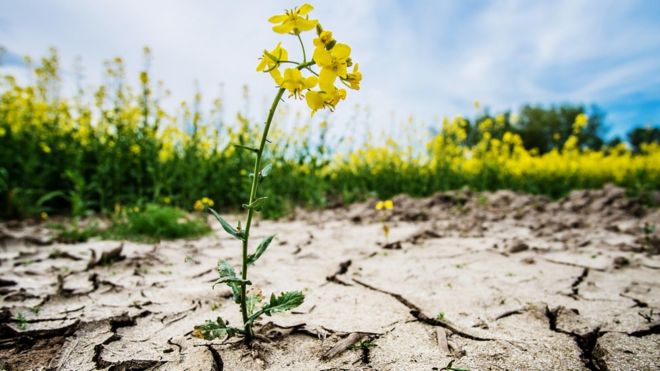
The study, based on 40 years of data on a range of measures, says governments are failing to address the crisis.
Without deep and lasting changes, the world is facing "untold human suffering" the study says.
The researchers say they have a moral obligation to warn of the scale of the threat.
Released on the day that satellite data shows that last month was the warmest October on record, the new study says that simply measuring global surface temperatures is an inadequate way of capturing the real dangers of an overheating world.
So the authors include a range of data which they believe represents a "suite of graphical vital signs of climate change over the past 40 years".
These indicators include the growth of human and animal populations, per capita meat production, global tree cover loss, as well as fossil fuel consumption.
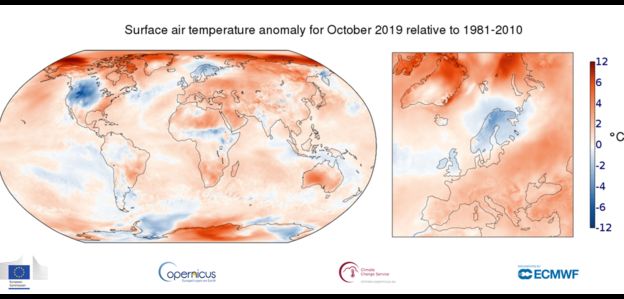
October was the warmest such month on record according to new data
Some progress has been seen in some areas. For example, renewable energy has grown significantly, with consumption of wind and solar increasing 373% per decade - but it was still 28 times smaller than fossil fuel use in 2018.
Taken together, the researchers say most of their vital signs indicators are going in the wrong direction and add up to a climate emergency.
"An emergency means that if we do not act or respond to the impacts of climate change by reducing our carbon emissions, reducing our livestock production, reducing our land clearing and fossil fuel consumption, the impacts will likely be more severe than we've experienced to date," said lead author Dr Thomas Newsome, from the University of Sydney.
"That could mean there are areas on Earth that are not inhabitable by people."
How does this differ from other reports on climate change?
The study echoes many of the warnings that have been reported by scientists including the IPCC. The authors set out to present a clear and simple graphical picture of a broader ranger of indicators that can drive home to the public and to governments that the threat is serious while the response has been poor.
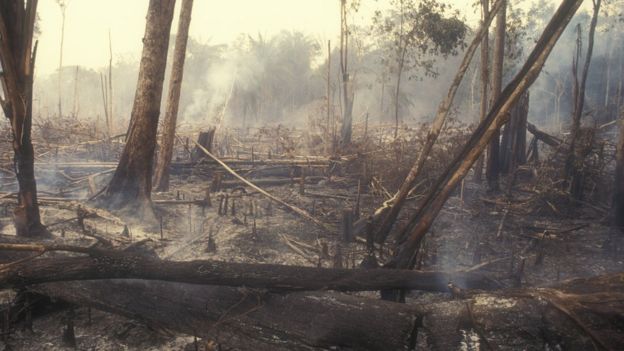
Tree loss needs to stop if countries are serious about climate change
Where it differs is in showing that while things might be bad, they are not hopeless. The researchers show six areas in which immediate steps should be taken that could make a major difference.
These are:
Energy: Politicians should impose carbon fees high enough to discourage the use of fossil fuels, they should end subsidies to fossil fuel companies and implement massive conservation practices while also replacing oil and gas with renewables.
Short-lived pollutants: These include methane, hydrofluorocarbons and soot - the researchers say that limiting these has the potential to cut the short-term warming trend by 50% over the next few decades.
Nature: Stop land clearing, restore forests, grasslands and mangroves which would all help to sequester CO2.
Food: A big dietary shift is needed say researchers so that people eat mostly plants and consumer fewer animal products. Reducing food waste is also seen as critical.
Economy: Convert the economy's reliance on carbon fuels - and change away from growing the world's gross domestic product and pursuing affluence.
Population: The world needs to stabilise the global population which is growing by around 200,000 a day.
So who are the scientists who have endorsed the report?
Some 11,000 researchers of all types and varieties from 153 countries have endorsed the research
The authors say they didn't target individuals so there is a marked lack of some of the bigger names in climate change research.
All the details of who's signed the endorsement have been published online.
"We have rising emissions, rising temperatures, and we've known this for 40 years and we haven't acted - you don't need to be a rocket scientist to know we have a a problem," said Dr Newsome.
What do the authors want to happen now?
The researchers are fed up because multiple climate conferences and assemblies have failed to produce meaningful action. However they believe that the growing, global protest movement offers hope.
"We are encouraged by a recent global surge of concern - governments adopting new policies; schoolchildren striking; lawsuits proceeding; and grassroots citizen movements demanding change.
"As scientists, we urge widespread use of the vital signs and hope the graphical indicators will better allow policymakers and the public to understand the magnitude of the crisis, realign priorities and track progress."
So what about human population growth?
The idea of trying to influence human population growth is highly controversial and has been deemed too hot to handle by UN negotiators. The authors say that looking the other way is no longer an option.
"It is certainly a controversial topic - but I think that population should be talked about when considering human impacts on the Earth," said Dr Newsome.
"It's important when presenting these results to look at some positives, and one of the more positive things that we've pulled out of this data is that there is now a slight decline in birth rates at a global level."
/* src.: https://www.bbc.com/news/science-environment-50302392

 Puck Futin
Puck Futin
-
11-07-2019, 07:17 PM #742
Đòi tiền "bảo vệ"!
Mike Pompeo carries divisive US messages to Germany
US top diplomat Pompeo is in Germany to commemorate the fall of the Berlin Wall. He knows the country well, as he was stationed here during the Cold War. But how much longer will the US keep troops stationed in Germany?
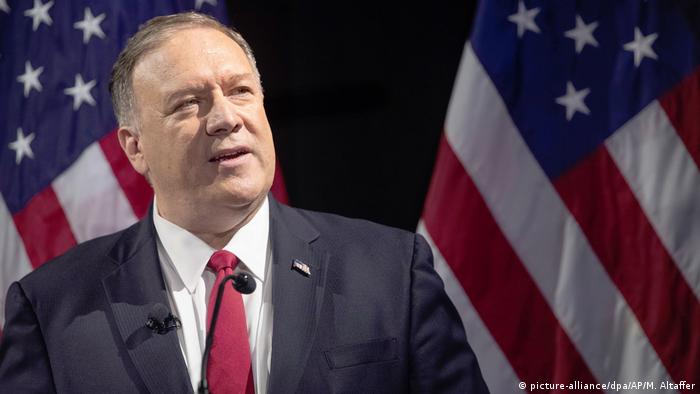
Germany isn't exactly unfamiliar territory for US Secretary of State Mike Pompeo, who arrived in the country on Wednesday for a three-day visit. In fact, he was stationed here in the 1980s in what was then West Germany.
After graduating top of his class from West Point Military Academy, Pompeo found himself patrolling the Berlin Wall before serving as a tank commander at a base in Bavaria.
Following German reunification, the US pulled many of its troops from the country in a protracted withdrawal that would continue for decades. The base where Pompeo served, located in the strategic location near both the former East Germany and Czechoslovakia, would close like many other US facilities in Germany.
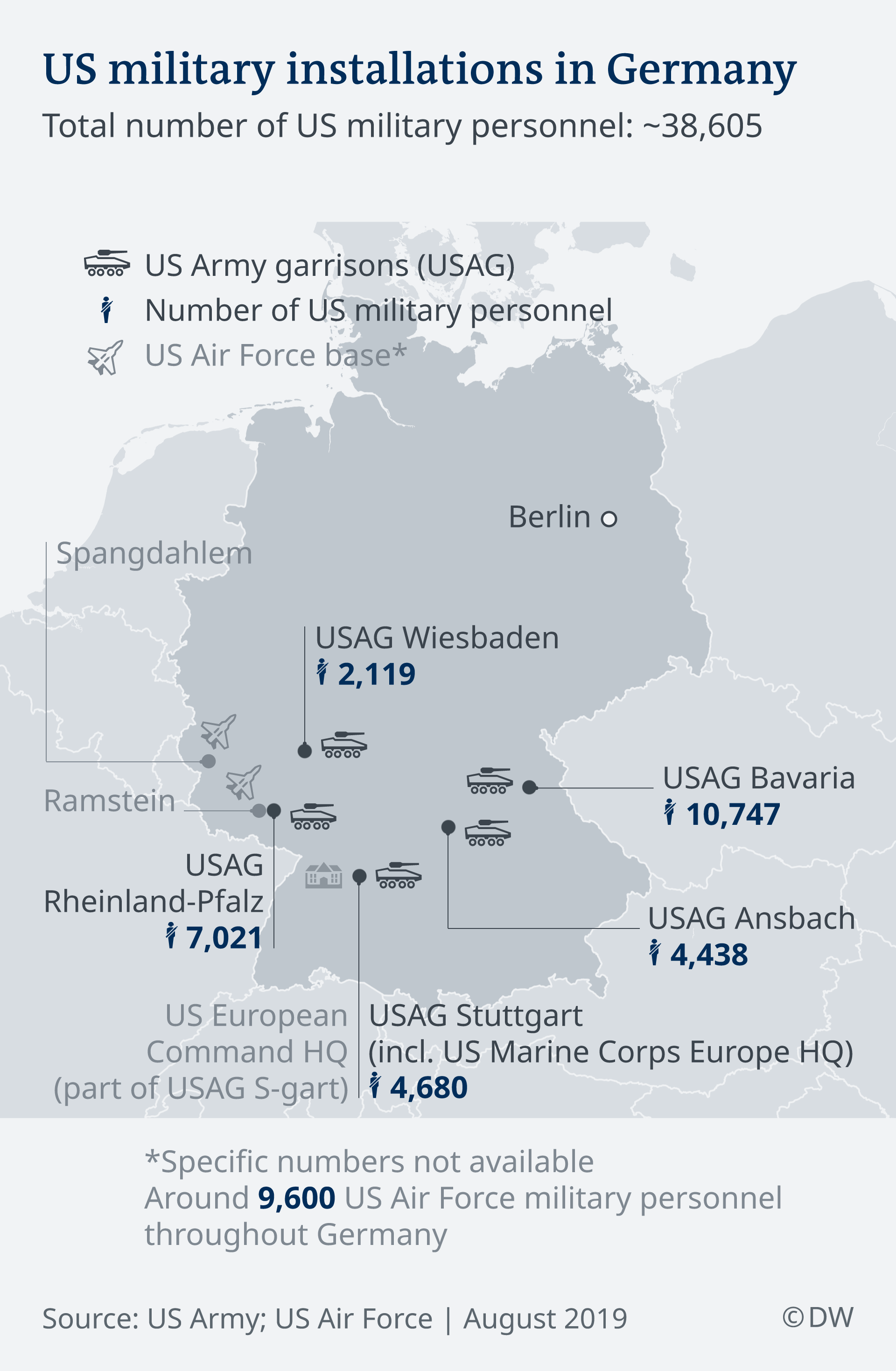
Scaled-down US presence after Cold War
In 1990, as the Cold War was coming to an end, the United States still had more than 200,000 soldiers stationed in the western part of Germany. In the eastern part of the country, there were more than 400,000 Soviet soldiers — reportedly the largest-ever occupying force to be permanently based in a foreign country.
While the last of these forces were pulled from the former East Germany in 1994, NATO troops remained in the western part of Germany. There are currently around 38,000 US military personnel stationed on German soil, predominantly in Rhineland-Palatinate, Bavaria, Baden-Württemberg and Hesse.
Just how long those troops remain in Germany, however, is likely to be on the agenda when Pompeo meets German Chancellor Angela Merkel, Foreign Minister Heiko Maas, Defense Minister Annegret Kramp-Karrenbauer and Finance Minister Olaf Scholz.
Trump threatens troop drawdown
Washington has called on its NATO allies to increase military funding and tied statements about withdrawing or moving US soldiers out of western Europe to defense spending goals agreed by the military alliance's members.
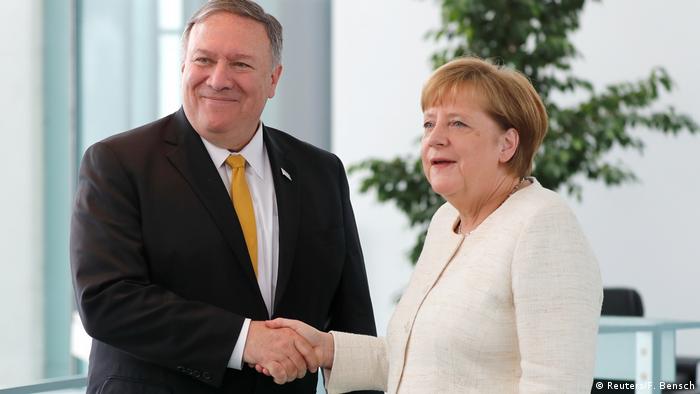
Pompeo was last in Germany for a meeting with Merkel in M
Yet so far, the US has not delivered on its threat. Possibly also because today, the US military chiefly coordinates its African and Asian operations from its German bases, like Ramstein. Germany, it seems, has become indispensable for the US, as ongoing investments in its bases make clear.
In August, however, US Ambassador to Germany Richard Grenell told German news agency dpa: "Multiple presidents have asked Europe's largest economy to pay for its own defense. This request has been made over many years and by many presidents."
NATO has agreed that each member country should invest 2% of its annual GDP in defense spending. But as Germany remains far below this spending target, US President Donald Trump in June threatened to relocate 1,000 soldiers to neighboring Poland, which honors the 2% target.
Pompeo is also expected to discuss 5G technology, the Nord Stream 2 pipeline, which the US opposes, and growing concerns in Washington bout economic and strategic threats from Russia, China and Iran.
/* src.: https://www.dw.com/en/mike-pompeo-ca...any/a-51144192
FACTCHECK
Trump’s False Claims at NATO
By Eugene Kiely, D'Angelo Gore and Robert Farley
Posted on July 12, 2018
At the NATO summit in Brussels, President Donald Trump made several false statements about the defense spending of the member countries.
- The president falsely said “prior to last year” the amount other NATO countries spent on defense “was going down and down very substantially.” In fact, NATO Europe and Canada increased defense spending in 2015 and 2016.
- Trump also was wrong when he said that “many countries [in NATO] owe us a tremendous amount of money for many years back, where they’re delinquent … because the United States has had to pay for them.” Countries in the alliance that spend less than 2 percent of their GDP on their own defense are not required to pay countries that do.
- The president repeatedly claimed that “everyone has agreed to substantially up their commitment.” But leaders of several European nations later said there were no formal agreements to increase spending beyond previously set goals.
Defense Spending Increases
At his press conference after the summit, Trump criticized NATO countries for failing to meet a commitment they made in 2014 to increase their defense spending to at least 2 percent of each country’s gross domestic product within a decade.
The countries memorialized that commitment at the Wales summit in September of that year after then-President Obama urged the allies to increase spending to combat Russia’s aggression in the Ukraine and the terrorist group known as ISIS.
NATO countries did increase defense spending in 2015 and 2016, but Trump falsely claimed that “prior to last year” their defense spending went down “very substantially.”
Trump, July 12: Prior to last year, where I attended my first meeting, it was going down — the amount of money being spent by countries was going down and down very substantially.
Trump’s first NATO meeting was in May 2017 — about two-and-a-half years after the commitment NATO countries made in Wales to increase defense spending.
As shown in the chart below from a July 10 NATO report, NATO Europe and Canada responded by increasing defense spending by 1.83 percent in 2015 and 3.14 percent in 2016 before Trump attended his first meeting.
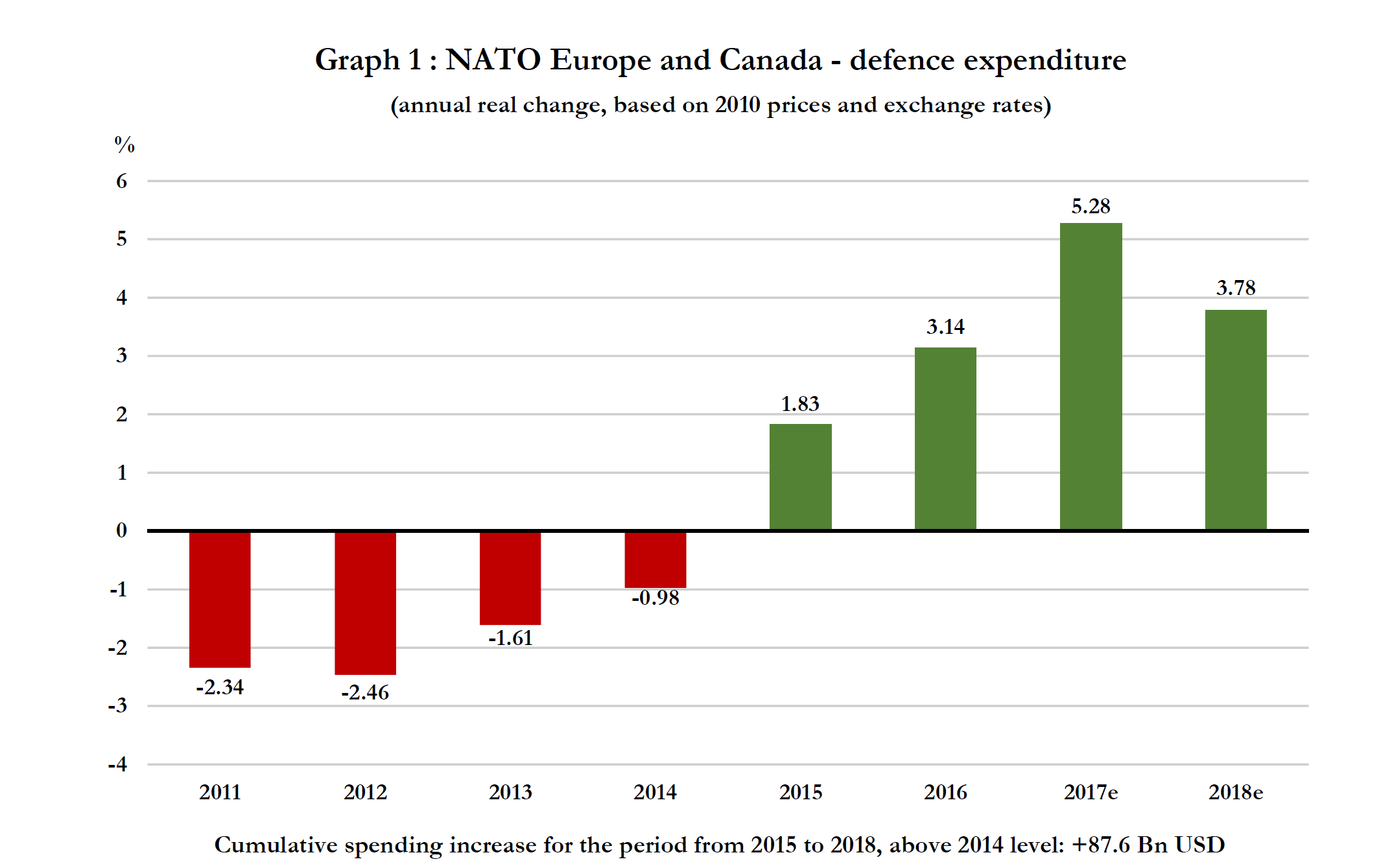
In constant 2010 U.S. dollars, NATO Europe and Canada increased their defense spending by $14 billion, or 5 percent, from 2014 to 2016, as the chart below shows.
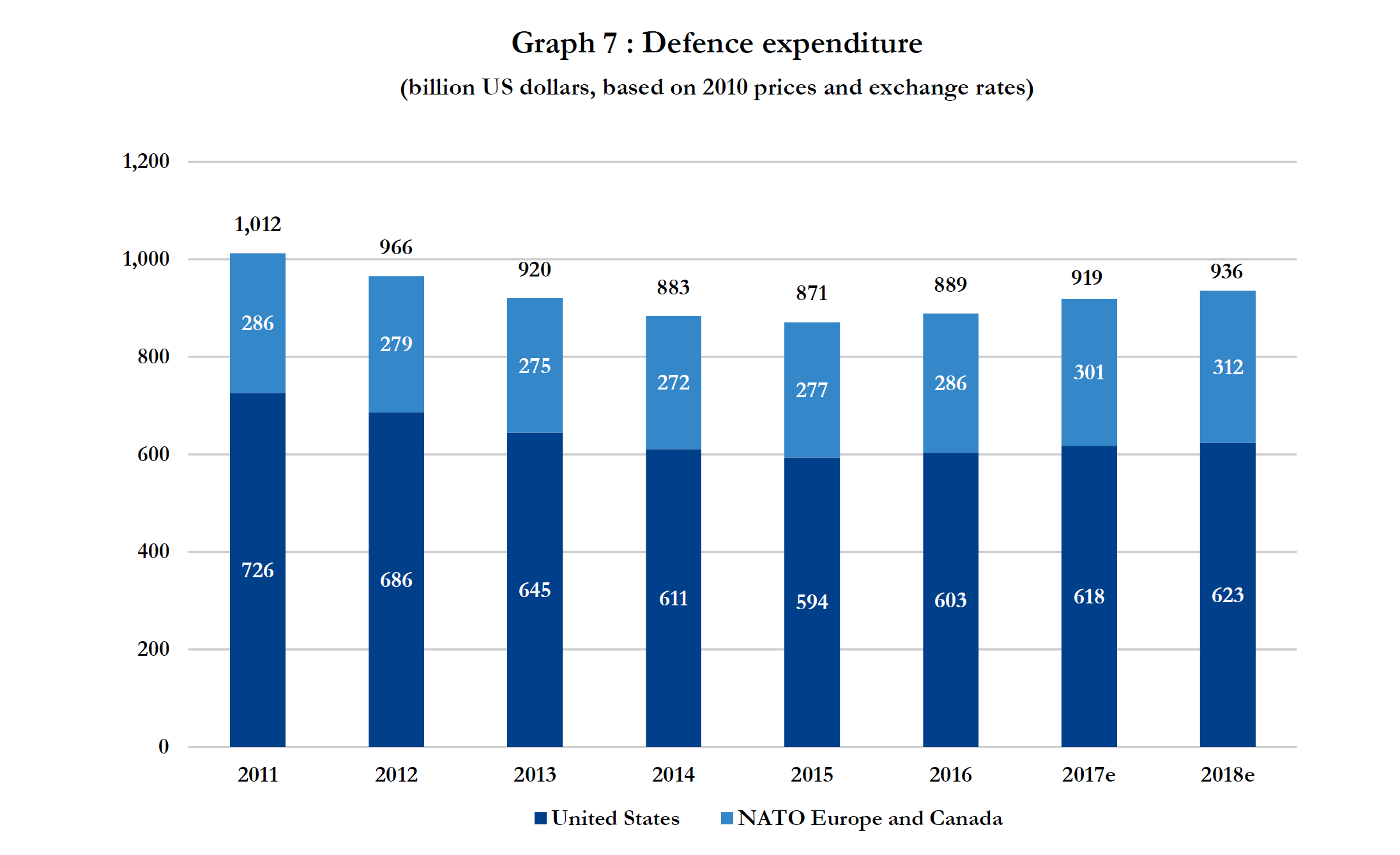
Since Trump’s meeting, the other NATO countries have increased their spending even more — by $26 billion, or 9 percent, from 2016 to 2018, as the NATO chart shows. Trump likes to take credit for the increased spending by NATO countries, but he cannot say that “prior to last year … the amount of money being spent by countries was going down and down very substantially.”
NATO Countries Don’t Owe Money to the U.S.A day earlier at a breakfast meeting, Trump wrongly claimed that NATO countries that have not been spending 2 percent of GDP for defense owe the U.S. “a tremendous amount of money.”
Trump, July 11: And, frankly, many countries [in NATO] owe us a tremendous amount of money for many years back, where they’re delinquent, as far as I’m concerned, because the United States has had to pay for them. So if you go back 10 or 20 years, you’ll just add it all up. It’s massive amounts of money is owed.
But Trump is again referring to the amount of money that countries independently decide to spend on their own defense budgets. There is no requirement that countries that spend less than 2 percent of GDP on defense reimburse those countries that do.
The president’s statement “is not accurate,” Christopher Preble, vice president for defense and foreign policy studies at the libertarian Cato Institute, told us in an email.
“NATO countries do not owe the United States money. And the commitment they made to reach the 2% of GDP threshold was to have done so by 2024,” Preble wrote. “NATO member states fund their own militaries. They don’t pay us to fund ours,” he said.
In fact, for the majority of the 29 countries in the alliance, the 2 percent of GDP benchmark is just a “guideline,” not a mandate.
When NATO leaders originally committed in 2006 to try to spend that much on their own defense, a NATO spokesman made it clear that “this is not a hard commitment that they will do it. … But it is a commitment to work towards it.” And a 2014 press release about the Wales summit said that countries again agreed to either “aim to continue” spending that amount or “aim to move towards the 2% guideline within a decade.”
As of 2018, only four members of the alliance “have either national laws or political agreements which call for at least 2% of GDP to be spent on defence annually,” according to NATO. They are Latvia, Poland, Lithuania and Romania.
A New Agreement?
Trump repeatedly claimed that “everyone has agreed to substantially up their commitment.” But leaders of several European nations later said there were no formal agreements to increase spending beyond previously set goals, and none was provided by NATO.
Asked during a press conference for details about new commitments agreed to at the summit, NATO Secretary General Jens Stoltenberg said only that everyone “developed a better common understanding of the challenges, the urgency of spending more” and that allies had promised to “redouble their efforts” to increasing defense spending.
However, Trump left the impression that specific new commitments for funding had been agreed upon.
“Everyone has agreed to substantially up their commitment,” Trump said in the press conference after the summit. “They’re going to up it at levels that they’ve never thought of before.”
Later, Trump said, “Everybody in that room, by the time we left, got along. And they agreed to pay more, and they agreed to pay it more quickly.”
In the past, funding commitments were only an “amorphous number” and a “goal,” but now, he said, they are “a real commitment.”
Trump, July 12: The commitments are made at a higher level than they’ve ever been made. And the money, it will be paid out faster — far faster. You know, the 2 percent was a range, a goal. It wasn’t something that they were committed to. Now it’s a commitment. There’s a big difference — the 2 percent number. And that’s why so many people weren’t reaching it or hitting it. It was just sort of like this amorphous number out there. Now it’s a commitment, a real commitment.
As we explained, in 2006, NATO members agreed to try to spend at least 2 percent of their gross domestic product on defense spending. And in 2014, they agreed again to aim to meet that standard by 2024.
After the summit, several NATO leaders said no new commitments had been made that would alter those agreements.
“I made clear that we know that we have to do more and that we have been doing so for quite a while,” German Chancellor Angela Merkel said. “That turning point has long been initiated. … The American president has demanded, what has been discussed for months, that the burden-sharing has to change. And we made clear, well, I made clear for myself and others also made it clear, that we are on this path, which is in our own interest and can make us overall stronger.”
“It confirms the goal of 2 percent by 2024. That’s all,” said French President Emmanuel Macron.
“Everyone agreed to raise spending as they agreed in 2014, and everyone agreed to respect the commitments they made,” Macron said. “We reaffirmed a credible budget strategy that meets our needs.”
And, Bloomberg reported, “Italy has no plans to change its defense spending plans as a result of the summit, Prime Minister Giuseppe Conte told reporters. Italy has focused more on targets other than the 2 percent goal, such as increasing its participation in NATO missions. ‘It isn’t just an accounting issue,’ Conte said.”
According to NATO figures, Germany, France and Italy spend 1.24 percent, 1.81 percent and 1.15 percent of their annual GDP on defense, respectively.
In a press conference after the summit, a reporter for the Washington Post asked Stoltenberg for details on any new commitments agreed to in the meetings.
Stoltenberg replied generally that everyone “developed a better common understanding of the challenges, the urgency of spending more, and allies committed to spending and to investing in our shared security.”
A reporter from the Financial Times tried again, asking, “On the substance, can you confirm then that nothing was agreed this morning either formally or informally that commits member states to going beyond the Wales 2 percent target or indeed any other commitments?”
Stoltenberg similarly replied: “We have made conclusions at this summit which confirms our support for NATO, the importance of investing more and all our allies agreed that we need to deliver on our commitments. There is a new sense of urgency. And all allies agreed to redouble their efforts.”
While the Summit Declaration issued after this year’s meeting continued to refer to the goal that 2 percent of GDP be spent on defense by 2024, Stoltenberg did highlight one small change. “Initiated by President Trump, last year, we agreed to develop national plans,” Stoltenberg said. “We have clearly stated this year that we need credible national plans, and I expect all allies to follow up on their national plans. And the national plans are a very valuable tool to make sure that we deliver, and that we increase defense spending substantially.”
Repeats
Trump repeated several other inaccurate claims that we have written about before.
- Trump repeated the inaccurate claim that the U.S. is paying “probably 90 percent of the cost of NATO.” But as we wrote recently, the U.S. share of the commonly funded NATO budget is just over 22 percent, according to NATO’s most recent figures. Trump is conflating the cost of operating NATO with the amount NATO countries spend on their own defense, which for most is below 2 percent of GDP. The U.S. share of total defense spending by all NATO members in 2017 was an estimated 67 percent, according to inflation-adjusted figures from NATO.
- Trump again wrongly claimed that Wisconsin was the one state Ronald Reagan lost in 1984. “One of the states we won, Wisconsin — I didn’t even realize this until fairly recently — that was the one state that Ronald Reagan didn’t win when he ran the board his second time,” Trump said. “He didn’t win Wisconsin, and we won Wisconsin.” In fact, Reagan won Wisconsin in 1980 and again in 1984, and pretty handily at that.
- And finally, Trump repeated the claim that he opposed the Iraq war before it started. “I was not in favor of that war,” Trump said. “I was very much against that war. I never thought it was a good thing. But that’s another deck of cards that I inherited, and we’ll do the best we can with it.” As we wrote many times during the 2016 campaign, there’s no evidence he publicly opposed the war before it started, though there is some evidence he supported it.



/* src.: https://www.factcheck.org/2018/07/tr...laims-at-nato/

 Puck Futin
Puck Futin
-
11-09-2019, 11:48 AM #743
Hôm qua cảnh sát Anh đã công bố tên tất cả những nạn nhân trong xe chở hàng.
Police name 39 Vietnamese victims
https://www.bbc.com/news/uk-england-essex-50350481
Ten teenagers, including two 15-year-old boys, were among the victims.
Most of those who died were in their 20s and 30s; there were 10 teenagers; and two were in their early 40s. Eight were women.
All the victims came from central or northern Vietnam.
Thương vì hai chữ di dân
...Cảm bởi một câu người Việt
(N Đ C)
-
11-09-2019, 04:33 PM #744
Anh hề Bô còn có niệm hoa trong khi Nguyễn Phú Trọng im re! Originally Posted by ốc
Originally Posted by ốc

 Puck Futin
Puck Futin
-
11-10-2019, 12:57 AM #745
Đọc trên đài Bi Bi Xi tiếng Việt nói anh Fúc có gửi thư chia buồn đến từng gia đình, dặn dò bận sau muốn đi nước khác thì cứ nhờ bác Tô Lâm có chuy ô đưa người trốn sang biên giới trăm lần đi trăm lần lọt, còn nếu là cán bộ thì có thể xin đi nhờ máy bay của chị Kim Ngân cho nó an toàn.
Văn phòng thủ tướng chính phủ mà viết bức thư tiếng Việt còn phải mượn tạm chữ Anh vì không có tiền mua quyển tự điển.

-
11-11-2019, 07:15 AM #746
-
11-14-2019, 03:56 PM #747
Germany: Don't panic over 'Islamic State' returnees' arrival
Berlin has tried to reassure the public that suspected German Islamic State supporters being deported from Turkey do not pose a security threat. Critics say the government should have brought them back sooner.
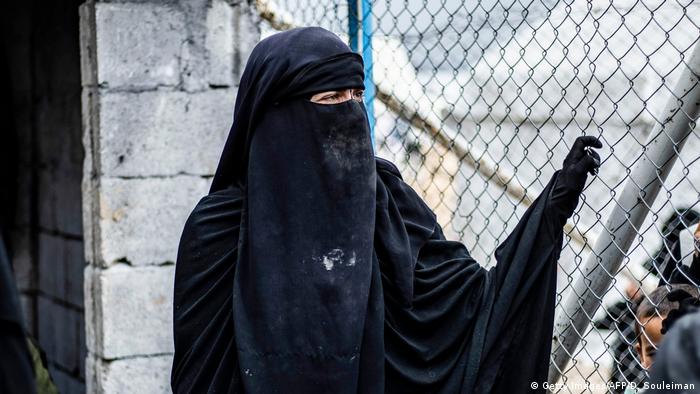
A family of seven German Islamists arrived in Berlin on Thursday after the Turkish Interior Ministry announced earlier this week that it would start deportations of captured "Islamic State" supporters.
There are no German arrest warrants for the family of German-Iraqi Kanan B., meaning they will be free to return to their homes in the central German state of Lower Saxony, though under police observation.
According to Turkish authorities, Kanan B. tried to travel to Syria with his family about a year ago, but it is not known if he arrived. The family, consisting of two parents, two adult children, plus three minors, had been in custody in the Turkish city of Izmir since March.
German authorities said they do not believe Kanan B.'s family ever joined Islamic State, but that he was part of the "Salafist spectrum," which means the family members are thought to observe a particularly conservative interpretation of Islam.
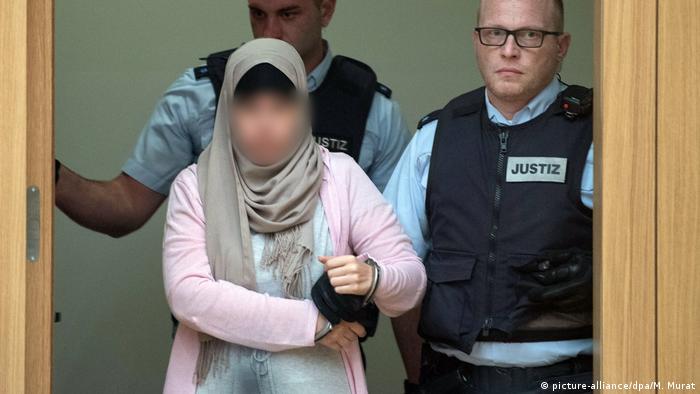
Several IS returnees have already been put on trial in Germany
No need for panic
Armin Schuster, the interior policy spokesman for Angela Merkel's Christian Democratic Union (CDU), insisted that the German returnees were not "serious cases," and warned against media-fueled hysteria.
"They did not take part in the fighting," he told the Deutschlandfunk radio station. "They won't be sent to prison but they have to be kept under surveillance." He added that the cases would be thoroughly assessed and that such procedures were routine for German security forces. Schuster also rejected reports that the Turkish announcement caught German authorities by surprise and that Ankara did not provide adequate notice ahead of the deportations.
More problematic deportations coming
The other two Germans being returned by Turkey in the coming days are "a little more difficult," Schuster said. The two women are already under investigation in Germany and are to be picked up by authorities at the airport, questioned and searched. Prosecutors will then decide whether there is enough evidence to issue an arrest warrant.
German opposition parties have been critical of the government's failure to face the problem sooner. Stephan Thomae, deputy leader of the Free Democratic Party (FDP), acknowledged that Berlin had little choice but to accept German citizens deported by another country, but "the government kept its head in the sand for a long time, didn't want to have anything to do with these cases," he told DW. "That is coming back to bite them now. It would have been better if the government had made contact with Turkey much earlier to discuss such processes."
Some critics have argued that German prosecutors have little chance of bringing cases against IS members because of the difficulty proving their suspected roles in the war in Syria.
But lawyer Mahmut Erdem insisted that it was "not impossible" for convictions to be made. Erdem represents several families whose relatives have left the country in an attempt to join IS, and works to bring them back from prisons in Turkey or Syria.
"We have to be able to bring the victims of these perpetrators to Germany as witnesses before a proper court," he said. "Why aren't Yezidi women questioned as witnesses?" He also pointed out that Kurdish groups had offered to help find evidence against foreign IS fighters.
Bring home, de-radicalize
Ninety-five German suspected IS supporters are believed to be in custody in Turkey, Syria, or Iraq. German police have active investigations against 33 of them and arrest warrants have been issued in 26 cases, according to the dpa news agency.
Meanwhile, dozens of IS members have already faced court in Germany after voluntarily returning, and even those against whom there is no evidence of actual crimes are usually put under surveillance by state police or domestic intelligence agencies.
Thomas Mücke, founder and head of the Violence Prevention Network, said it is possible to deradicalize IS returnees, as it is with any extremists, and that his organization has visited several in prison. "We have had experiences with 36 IS returnees," he told DW. "With young people, we can do a lot."
He pointed out that his organization had successfully helped a 17-year-old who had been put into a suicide command unit. "Today he is 24 and living a completely normal life in Germany," Mücke said.
He added that it would have been better to bring more people back to Europe, rather than leaving them in Turkish or Syrian prisons, surrounded by other extremists.
"That would've been more organized than is the case now," he said.
/* src.: https://www.dw.com/en/germany-dont-p...val/a-51253101

 Puck Futin
Puck Futin
-
11-16-2019, 04:05 AM #748
China threatens Sweden over support for jailed book publisher
Beijing is furious after Sweden's culture minister ignored warnings not to attend a ceremony honoring Chinese-born Gui Minhai, who is detained in the communist country. But Sweden says it won't be pushed around.
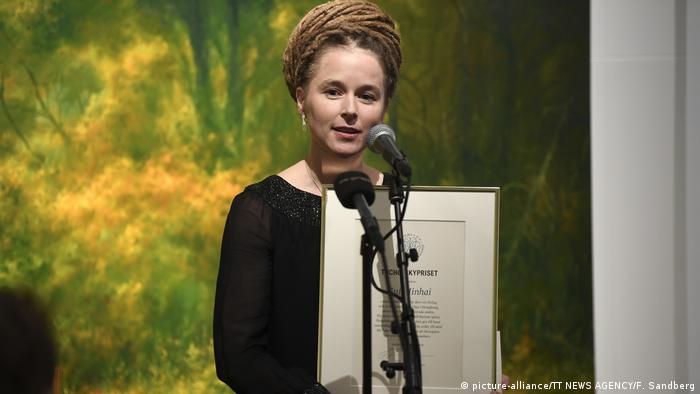
China threatened Sweden with "bad consequences" on Saturday, after the Scandinavian country's culture minister made a fresh show of support for a Chinese-born book publisher currently imprisoned by Beijing.
In a statement released Saturday, Chinese Ambassador Gui Congyou called the culture minister's attendance of a ceremony to honor the publisher a "serious mistake" and warned that "wrong deeds will only meet with bad consequences."
"Giving an award to such a criminal is an outright political farce ... It also constitutes a gross interference in China's judicial sovereignty," read the ambassador's statement.
On Friday, Swedish Culture and Democracy Minister Amanda Lind presented the Tucholsky Prize from free speech organization PEN International to Chinese-born Swede, book publisher Gui Minhai. Gui is currently imprisoned in an undisclosed location in China.
The Chinese ambassador had previously threatened to ban Lind from the country if she attended. The Saturday statement did not mention a ban.
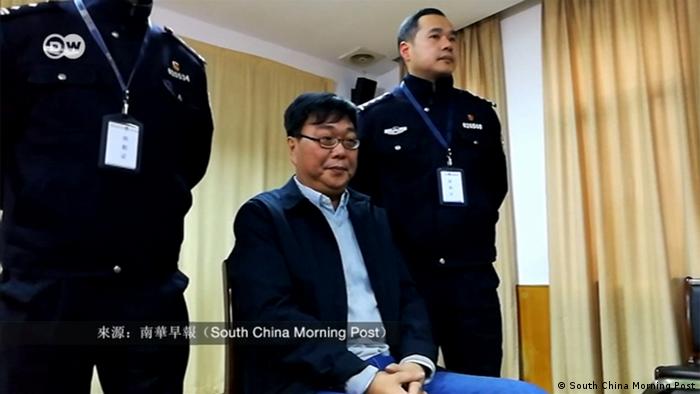
Gui authored more than 200 books before he vanished in 2015 while in Thailand
Free speech defended
Despite calling the threats "serious," Sweden remained defiant leading up to and during the ceremony.
On Swedish television prior to the event, Prime Minister Stefan Lofven said, "We are not going to give in to this type of threat. Never. We have freedom of expression in Sweden and that's how it is, period."
Lind also defended her planned attendance, telling reporters that her country continues to insist Gui be released and that freedom of expression must be respected in Sweden.
"This means that Swedish PEN must, of course, be allowed to award this prize to whoever they want, free of any influence," she said. "And as culture and democracy minister it is natural for me to attend the award ceremony."
Presenting the award in Stockholm on Friday, she added, "Those in power should never take the liberty to attack free artistic expression or free speech."
China makes threats
Working from Hong Kong, Gui published books critical of Chinese leaders prior to his arrest while on vacation in Thailand in 2015. He was briefly released in 2017 before being detained again three months later.
The Chinese ambassador said Gui is suspected of revealing state secrets and intelligence on China.
He argued that Gui is not an author and is instead a criminal who has "committed serious offenses in both China and Sweden, and was a lie-fabricator who viciously attacked the Chinese Government."
The Saturday statement alludes to "countermeasures" against Sweden and warns: "some people in Sweden shouldn't expect to feel at ease after hurting the feelings of the Chinese people".
kp/mm (AFP, AP)
/* src.: https://www.dw.com/en/china-threaten...her/a-51276420
Last edited by Triển; 11-16-2019 at 04:08 AM.

 Puck Futin
Puck Futin
-
11-18-2019, 04:34 AM #749
Van with 52 migrants rams Spanish enclave border

52 migrants in a van tried to forcefully cross the border separating the Spanish overseas enclave of Ceuta from Morocco. The autonomous Spanish cities of Ceuta and Melilla on Morocco's northern coast have the EU's only land borders with Africa.
A van carrying 52 migrants and going at high speed rammed a border barrier between Morocco and Spain to enter the Spanish enclave of Ceuta, officials said Monday.
A spokesman for the interior ministry’s office in Ceuta said the vehicle broke through a metal gate on the Spanish side of the border around 3 in the morning local time. It was not clear whether it had broken through other fences on the Moroccan side.
The official said the 52 migrants were all from sub-Saharan countries. They were only identified as 34 men, 16 women and two minors. Four were treated in a Ceuta hospital for minor injuries suffered in the crossing.
The driver was a Moroccan citizen and has been detained, said the official, who was speaking on condition of anonymity in line with government rules.
It was not the first time that vehicles carrying migrants have crashed through the border but the spokesman said Monday's incident involved the biggest number so far.
Previous attempts
Migrants gathered in Morocco normally try to scale the 6-meter (19.5 foot) wire fences that separate Ceuta from Morocco. The last such major attempt to cross the heavily guarded barrier took place in early September, when more than 150 migrants entered the Spanish enclave.
An interior ministry spokesperson said the migrants would be accommodated in a temporary holding center while their expected asylum petitions are examined. Once in Ceuta, the migrants normally apply for asylum or wait for an opportunity to travel to mainland Spain.

A van that managed to enter the Spanish enclave of Ceuta in northern Morocco with 52 migrants is removed in Ceuta on November 18, 2019 | Photo: imagoimages/Agencia EFE/Reduan
The autonomous Spanish cities of Ceuta and Melilla on Morocco's northern coast have the European Union's only land borders with Africa.
Separated from Spain by the Straits of Gibraltar, they are therefore the only way to enter the EU from Africa without crossing the Mediterranean. As such, they are a magnet for African migrants trying to reach Europe.
With material from AP
/* src.: https://www.infomigrants.net/en/post...enclave-border
 Puck Futin
Puck Futin
-
11-24-2019, 03:15 AM #750
Merkel and Macron Publicly Clash Over NATO
With relations at a new low, Chancellor Angela Merkel berated President Emmanuel Macron over his comments about the alliance’s ‘‘brain death.”

The German and French leaders are at odds over policy and style ahead of a NATO gathering outside London next month.Credit...Guillaume Horcajuelo/EPA, via Shutterstock
By Steven Erlanger
BRUSSELS — Angela Merkel, the German chancellor, was uncharacteristically furious. At a dinner to celebrate the 30th anniversary of the fall of the Berlin Wall, she huddled with President Emmanuel Macron of France, who had just given an interview in which he cited the “brain death” of NATO and wondered whether its commitment to collective defense still held.
Mr. Macron had also been the sole leader to veto the start of lengthy membership talks for North Macedonia to join the European Union, despite Skopje’s having done everything Brussels had asked of it, including changing the country’s name.
“I understand your desire for disruptive politics,” Ms. Merkel said. “But I’m tired of picking up the pieces. Over and over, I have to glue together the cups you have broken so that we can then sit down and have a cup of tea together.”
Mr. Macron defended himself, saying that he could not simply go to a NATO meeting in London in early December and pretend that the United States and Turkey had behaved in the collective interest in Syria.
“I cannot sit there and act like nothing has happened,” he said.
The conversation underscores the serious strains in the Franco-German relationship and the tensions surrounding the abbreviated NATO meeting on the outskirts of London, which was carefully downgraded from a summit to a gathering of leaders to celebrate the alliance’s 70th anniversary.

Turkish soldiers near the border with Syria last month.Credit...Burak Kara/Getty Images
“I haven’t seen Franco-German relations at such a low point in a very long time,” said Claudia Major, a security analyst with the German Institute for International and Security Affairs. “I’ve rarely seen such bitterness and misunderstanding.”
Mr. Macron, as an ambitious French president with nearly royal powers, is increasingly impatient with Ms. Merkel’s slow pragmatism and Germany’s federalism and coalition government, Ms. Major said.
His wish, “in his impatient and almost nervous style,” to lead and disrupt “clashes with the German system, which is very slow with Merkel in her last term and a coalition just trying to survive,” she said.
Mr. Macron is eager to put forward longer-term strategic proposals, but is increasingly impatient with a more stagnant Germany and a divided coalition in that country, where the left-leaning Social Democrats block his European military and security proposals and the conservative Christian Democrats block his proposals for more economic integration, higher spending and eurozone reform.
Mr. Macron misread Ms. Merkel, thinking that in her last term she would want to create a historical legacy for the European project, as Chancellor Helmut Kohl did by accepting the euro, and the French leader feels almost betrayed by her caution, a senior French official said.
But that is to misunderstand Ms. Merkel, who “does not have big visions and is as pragmatic as you can get, and she is not going to change after 10 years,” Ms. Major said.
Then there is NATO, which Germany relies on for deterrence along with the countries of Central and Eastern Europe, whose leaders have been sharply critical of Mr. Macron’s musings about the alliance’s weaknesses. Ms. Merkel refused to publicly accept Mr. Macron’s “brain death” criticism, calling his words “drastic.”
While many agree privately with Mr. Macron that President Trump’s unpredictability and moodiness have hurt NATO, made worse by his special dealings with an increasingly authoritarian and Moscow-leaning Turkish president, Recep Tayyip Erdogan, they believe it was wrong to state those doubts publicly.
Poland’s prime minister, Mateusz Morawiecki, called Mr. Macron irresponsible, describing his comments questioning NATO’s commitment to collective defense, known as Article Five, as dangerous. Mr. Morawiecki told his Parliament that any moves to question the guarantee included in the NATO treaty were a threat to the future of the European Union and the military alliance.
As François Heisbourg, a French defense analyst, put it, Mr. Macron was “talking like a think tanker” instead of as the leader of a key NATO ally and nuclear power. But there are divisions in NATO, he said, and “at least Macron is trying to address the problem at hand.’’
NATO officials are struggling to agree on a joint statement, something less than a formal communiqué, celebrating the anniversary and recommitting NATO members to more military spending.

President Trump and other leaders at the NATO summit in Brussels last year.Credit...Doug Mills/The New York Times
French officials are pressing for a reference to the need for a new strategic review of NATO’s mission, to replace the last one, which was completed in 2010 and is severely outdated, while most countries prefer to wait to see whether Mr. Trump is re-elected before broaching such a fundamental discussion of NATO’s purpose.
Germany’s foreign minister, Heiko Maas, trying to prevent a clash in London like the one that marred a tempestuous NATO summit meeting in Brussels nearly two years ago, has proposed an “expert group” to strengthen NATO’s political thinking.
The idea would be to put the group under the consensual direction of NATO’s secretary general, Jens Stoltenberg, who works hard to maintain good relations with Mr. Trump.
Mr. Stoltenberg is also traveling to Paris next week to meet Mr. Macron, presumably to discuss the French president’s interview comments calling into question the continuing validity of Article Five.
To question it aloud is to undermine it, something Mr. Trump was criticized heavily for doing early in his presidency, when he initially hesitated to endorse the provision and then mused over whether America would fight for Montenegro, a NATO member.
All of that has brought some glee to Russia’s ambassador to the European Union, Vladimir Chizhov, who praised Mr. Macron’s remarks and his veto of accession talks to the European Union of North Macedonia and Albania, something Moscow has been working for years to forestall.
Moscow has also worked to undermine NATO and keep it from enlarging to the Balkans, Georgia and Ukraine.

Macedonians voted last year to rename their country to settle a long-running dispute with Greece and clear a path to NATO membership.Credit...Robert Atanasovski/Agence France-Presse — Getty Images
“In the light of President Macron’s statement,” Mr. Chizhov told The Financial Times, NATO “has a lot to discuss in close format” in London next month. He added: “We all know what President Trump had to say about NATO at different stages of his presidency.”
There are also concerns among allies that Mr. Macron is considering a speech about creating a nuclear deterrence based on Europe, so as not to rely on the Americans.
That idea will further infuriate Berlin and the Central Europeans, in part because no one believes that France’s nuclear deterrent is capable of covering the Continent, and the British nuclear deterrent is almost entirely dependent on American nuclear missiles.
Mr. Macron loves being disruptive and asking questions that others do not ask, at least in public. But if he does that on the question of nuclear deterrence, Ms. Major said, “it will be champagne on ice in Moscow.”
/* src.: https://www.nytimes.com/2019/11/23/w...core-ios-share

 Puck Futin
Puck Futin






 Reply With Quote
Reply With Quote


